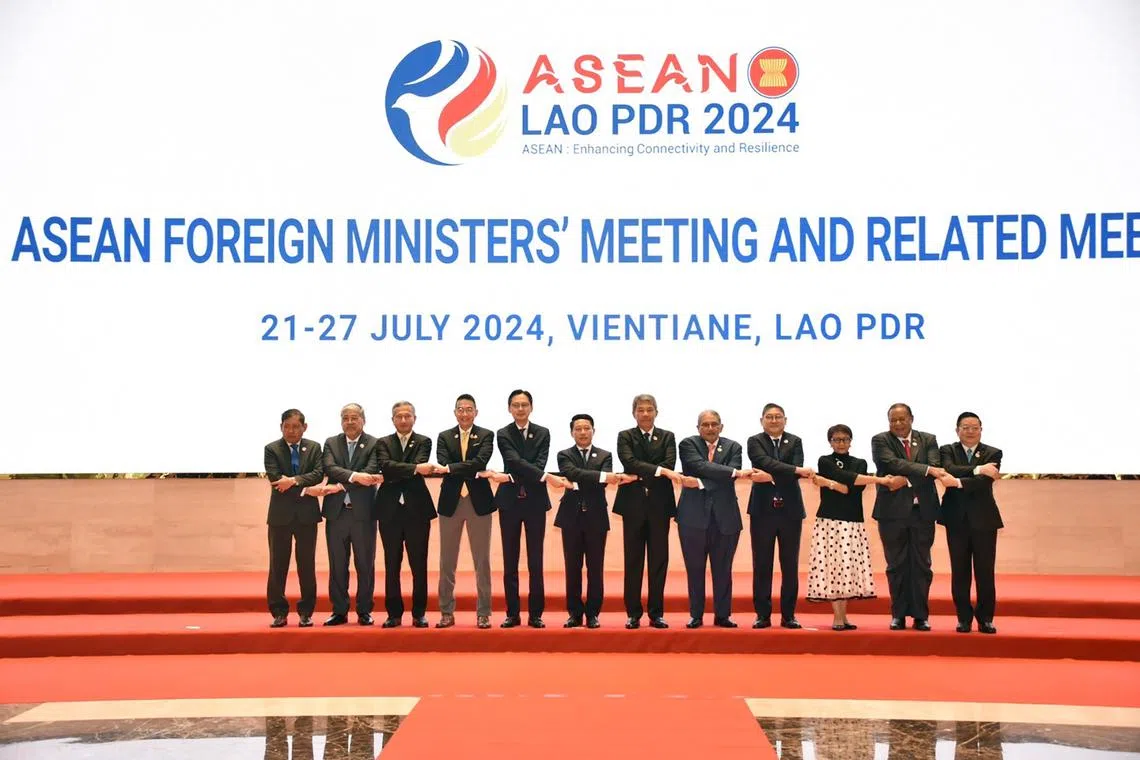Asean foreign ministers stand by Myanmar peace plan
Sign up now: Get insights on Asia's fast-moving developments

Asean’s foreign ministers are expected to release a joint communique about their discussion on July 25.
PHOTO: EPA-EFE
VIENTIANE, Laos - Asean foreign ministers on July 25 stuck by the bloc’s peace plan for Myanmar, even as a civil war sparked by the country’s 2021 military coup widens.
Sharing on social media the discussions during the Asean Foreign Ministers’ Meeting in Vientiane, Singapore’s Foreign Minister, Dr Vivian Balakrishnan, wrote that he and his counterparts “discussed regional and geopolitical developments, including the deteriorating situation in Myanmar and the importance of upholding the implementation of the Five-Point Consensus”.
Among other things, the plan calls for the cessation of violence
More than three million people have been forced to flee their homes so far as the Myanmar military battles ethnic armed groups and anti-junta People’s Defence Forces for control of the borderlands. A recent ceasefire brokered by China also failed to hold.
On July 25, for example, the ethnic minority Myanmar National Democratic Alliance Army claimed to have captured the military’s North-eastern Regional Military Command headquarters in Lashio, an important administrative centre in Shan state near China. This was denied by a junta spokesperson.
Indonesia’s Foreign Minister, Ms Retno Marsudi, in a post on the X platform after a bilateral meeting with Dr Balakrishnan on July 24, said both countries shared the same view on the lack of commitment of the Myanmar military junta to implement the five-point consensus.
Since Myanmar junta chief Min Aung Hlaing and leaders from the other nine Asean countries agreed to the plan in April 2021, the regime has only become more brutal at quelling resistance to its rule.
Yet, “Asean is very clear that the five-point consensus remains the main reference on solving the crisis in Myanmar”, Mr I Gede Ngurah Swajaya, who heads the office of the special envoy of Indonesia for Myanmar, told The Straits Times in Vientiane on the sidelines of the meetings.
Mr Ngurah, who is also Indonesia’s Ambassador to Switzerland, told ST there was no discussion among Asean foreign ministers about the election, which Myanmar’s junta has promised but has yet to hold after overthrowing its democratically elected civilian government.
According to Mr Ngurah, all Asean foreign ministers – except for Myanmar’s representative, Mr Aung Kyaw Moe, the permanent secretary of the junta-controlled foreign ministry – have reaffirmed the five-point consensus.
“Asean unity remains very solid,” he said.
Given the turmoil, Asean has barred political appointees from Myanmar at its high-level meetings by inviting only a “non-political representative” from the country. The junta, which initially sat out of the meetings, began sending a senior bureaucrat in January.
Mr Ngurah said there were discussions for Asean’s current special envoy on Myanmar, veteran Lao diplomat Alounkeo Kittikhoun, to hold a meeting involving Asean states, Myanmar’s neighbours and the United Nations’ recently appointed special envoy on Myanmar, Ms Julie Bishop.
Asean is calling for the international community to scale up humanitarian assistance to Myanmar, he said. According to the UN Office for the Coordination of Humanitarian Affairs, just 12 per cent of the US$994 million (S$1.34 billion) required to aid Myanmar in 2024 was raised as at June.
Asean’s foreign ministers are expected to release a joint communique about their discussion on July 25, which included the intensifying confrontations between rival claimants in the South China Sea and the Gaza conflict.
According to Dr Balakrishnan, the ministers also spoke about Asean integration and strengthening collective resilience.
“Enhancing energy security ranks high amongst Asean’s priorities. We need collective access to renewable energy to meet our emissions reduction targets. Energy interconnectivity and cross-border regional trade of energy through an Asean Power Grid will be an important step to realising these goals,” he wrote.
“Asean is also making steady progress on its Digital Economy Framework Agreement targeted for completion by 2025. An open, secure, interoperable and inclusive regional digital economy will empower businesses, boost investments and enhance Asean’s relevance in the global digital economy,” he added.
Kicking off the discussion, Lao Foreign Minister Saleumxay Kommasith had sought to put some perspective on Asean’s challenges, saying that the 57-year-old grouping had contributed to the “promotion of peace, stability, prosperity in the region and beyond”.
“The achievements of Asean have been possible thanks to our unwavering collective effort and Asean ways, which demonstrate our cohesion and unity amid diversity,” he said.
“In the light of rapid and complex geopolitics and geoeconomic change, we need to further enhance Asean centrality and unity, so as to promote the relevance and resilience of Asean, aiming at addressing emerging challenges and seizing opportunity in the future.”
From July 26, Asean foreign ministers will begin a series of meetings with their counterparts from the bloc’s dialogue partners, which include China, Japan, the European Union, Russia and the United States.



